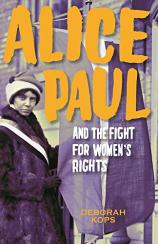Alice Paul and the Fight for Women's Rights: From the Vote to the Equal Rights Amendment
Review
Alice Paul and the Fight for Women's Rights: From the Vote to the Equal Rights Amendment
- Click here to read Sally Tibbetts's review.
Review #1 by Anita Lock
Born in 1885 and destined to be a feminist from an early age, Alice Paul first observes that women and men are equals through her Quaker roots. Limited by her Quaker environs even through college, Alice doesn't first experience the real world until the age of 20 where she spends time living and working among the poor in the Lower East Side of New York City. The eye-opening experience is a mere stepping-stone to a life-changing opportunity in England. At age 22, Alice attends Woodbrooke, a new study center for Quakers. While taking an economics class at the University of Birmingham, Alice's first introduction to the world of activism occurs when she witnesses a suffrage movement protest headed by the Women's Social and Political Union. She knows right then and there that this is a group that "I want to throw in all the strength I can give to help."
"A gripping read, Kops' latest non-fiction work for youth takes a keen look into the unrelenting acts of a feminist who changed the course of women's history in the U.S."
Alice's words ring true as she engages in many protests, followed by prison time and peppered with hunger strikes before she returns to the U.S. in 1910. Her activism primes her for her next project: pushing "Congress for an amendment to the U.S. Constitution giving women the right to vote." Setting up a Congressional Committee (1913) and developing the National Women's Party (1916), Alice zeroes in on Woodrow Wilson, the one person who has the power to change the course of history for women. But to get his attention as well as the attention of Congress, Alice needs to incorporate clever tactics, such as up-front-and-center parades, sneaking in banners into the White House, scathing slogans (even using Wilson's words against him) and picketing. The latter a last-resort effort in 1917, culminates into the imprisonment of eight-nine women some of whom go on hunger strikes (including Alice) because of their ill treatment.
Alice and her fierce crew press on another three years before the 19th Amendment is ratified. But there's more to come. Amid years of verbal and physical abuse fighting for women's rights, surprisingly Alice lives to the ripe old age of ninety-two. She lives to see two important documents that she pens come to fruition: the 1973 ERA (Equal Rights Act) and the "sex" amendment in Title VII of the 1964 Civil Rights Act.
A gripping read, Kops' latest non-fiction work for youth takes a keen look into the unrelenting acts of a feminist who changed the course of women's history in the U.S. In her Author's Note Kops acknowledges that what she's produced isn't exactly a biography of Alice Paul because there are no primary sources that point to her personal life. Indeed, Alice was a private individual who lived and breathed the suffrage movement, as well as equal rights. Kops captivating narrative includes a "Who Is Who" section, source notes and a packed bibliography.
“I look forward to when we get real equality, and everybody can be what he or she wants to be, so that we’ll have a very much more perfect world in which to live.” -Alice Paul (Page 187).
Even as a little girl, Alice Paul was fierce. Raised in the Quaker faith, she knew early on that she was as important as her brothers, as her father and as any male person. She loved sports. She played tennis, enjoyed horseback riding (her favored means of transportation) and loved skating. Full of energy, highly intelligent and an independent thinker, Alice stood out among her classmates as a young woman of high energy and independence. Hers was a strong personality and she was not the least bit intimidated by her sex. She was the perfect woman to pick up the mantel of the suffragists before her.
"Deborah Kops’s book on Alice Paul is full of fascinating history and detail. This is a timely book to add to any Women’s Studies curriculum and should most definitely be included in high school and public library collections."
Her college years led her in the direction of public services and gave her a good background organizing groups and writing proposals. She stepped into a leading role in the advancement of women’s rights, forming the National Women’s Party. Eventually Paul would receive a doctorate degree in law that helped serve the suffragists in their tireless battle. The National Women’s Party became a rousing platform to gain equal rights, not just for women, but also for everyone.
In 1917, the eve of World War I, Woodrow Wilson could not be bothered with these very vocal, marching, and banner waving women. The women were often treated brutally by the police and even arrested. Several of them, including Paul, served time at the infamous Occoquan workhouse in Virginia. In prison they were force-fed and deprived of personal toiletries. Their struggles were well publicized and even the president was horrified when he heard what they had endured.
It took until 1920 for the 19th Amendment to finally pass allowing women to vote. But Paul knew that the struggles were not over --- she wanted equality for everyone whatever sex, religion, color or creed. She wanted to push through with the efforts of Susan B. Anthony and so many brave women who had set the path before her. Paul worked tirelessly for these causes well into her 80’s. She lived to see Title IX pass in 1972, which said no one could be discriminated against in the workplace on the basis of sex.
Deborah Kops’s book on Alice Paul is full of fascinating history and detail. Excellent research materials are included at the end, such as listings of important figures, Author’s Notes, Source Notes and a Bibliography. This is a timely book to add to any Women’s Studies curriculum and should most definitely be included in high school and public library collections.
No question that she would be on high alert today still working hard to make sure people are fairly treated. We can be grateful for women like Alice Paul who would not be stopped, and the men and women who continue to fight for the rights which should be given to all.
Reviewed by Anita Lock and Sally Tibbetts on March 15, 2017
Alice Paul and the Fight for Women's Rights: From the Vote to the Equal Rights Amendment
- Publication Date: February 28, 2017
- Genres: Biography, History, Nonfiction, Young Adult 11+
- Hardcover: 216 pages
- Publisher: Calkins Creek
- ISBN-10: 162979323X
- ISBN-13: 9781629793238





